Matthew Yglesias's Blog, page 2367
April 1, 2011
Endgame
Take my problem to the United Nations:
— "Evolving Structure Of US Economy And The Employment Challenge".
— Laura Ingraham commands $30-50,000 per appearance as a speaker.
— I'm against Koran burning and even more against murderous mob violence.
— Rebecca Black, Miley Cyrus, and rent seeking.
Multilateral! PJ Harvey, "The Words That Maketh Murder".


Confederate Inflation
Very interesting historical note from David Beckworth about the monetary systems during the Civil War. Here's a chart showing the value of confederate dollars, which tended to fall both because of excessive monetary inflation and because of growing doubts that the country issuing the notes would continue to exist:
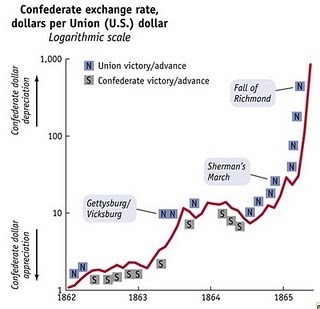
One interesting thing you can do with this data is look at 1864 as a proxy of market expectations of Lincoln's re-election. In the absence of polling, we're normally left with conjecture as to the state of this campaign and when sentiment turned in his favor, but with the currency data we can spot the turning point quite precisely.


Getting Serious About Funding Disparities
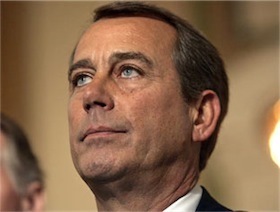
The next step in the DC voucher farce, it seems, is that not only will House Republicans push for the DC scholarship program, John Boehner will propose supporting it as the sine qua non of "serious" education reform.
This is, plainly, nonsense. The underlying model of the program—deploy federal dollars to send some poor kids to private school over and above the existing public school system—plainly doesn't work at any kind of meaningful scale and its Republican proponents have no interest in attempting to scale it up. As a DC resident, I'm happy if congress wants to send extra cash our way, but as my colleague Theodora Chang writes the real task is tackling systemic issues in American education like some of the nutty funding disparities allowed by current Title I rules:
"Getting serious about education" requires addressing the deeper funding issues that affect all students, starting with fiscal equity. Equal opportunities for students are hindered by inequitable funding formulas at the state and district level as well as under Title I of the Elementary and Secondary Education Act. Studies show that students attending high-poverty schools actually need more funding to achieve at the level of their wealthier counterparts, but reality shows us shortchanging our students.
One key issue here is the comparability loophole that instead of equalizing actual staff funding between rich and poor schools merely mandates "comparable" staffing. That means that if one school has three math teachers and another school has three math teachers, they've both got a "comparable" number of math teachers. This, however, is perfectly compatible with School A having a giant budget to pay veteran teachers while School B is stuck with a rotating cast of novices. Its like saying the LA Lakers and the Cleveland Cavaliers are "comparable" because they both have full rosters of basketball players without noticing that LA has $38 million more in payroll that they use to hire Kobe Bryant and Pau Gasol instead of Daniel Gibson and JJ Hickson.


Grass Greener For Some Grass Cutters

(cc photo by DRB62)
Education priorities fact of the day from Joanne Jacobs:
Eighteen grass cutters and three pest sprayers earned $50,000 last year working for Broward County schools, more per day than most teachers with 10 years experience, reports the South Florida Sun-Sentinel. Seventeen stock clerks earned $52,000 or more; two mail clerks were paid $49,000. Painters and roofers outearned teachers with 16 years of experience: 34 painters and 24 roofers made at least $59,000.
Now grass cutters making 50 grand a year are hardly the lucky duckies of American life, but I would posit that the quality of groundskeeping has a relatively minor impact on student learning compared to the quality of teaching.


The Limits of Knowledge in a Revolutionary Scenario
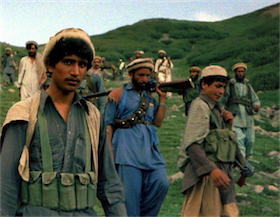
The precise nature of the rebel groups the US, France, and Britain are supporting in Libya remains somewhat mysterious, which has raised a lot of eyebrows among skeptics of the operation. And, certainly, I think this is legitimate grounds for doubt. As Aswini Anburajan :
Knowing thy allies should be as critical as knowing one's enemies, as the U.S. learned in supporting and arming Afghan rebels in the war against the Soviets in the 1980s. The BBC reports that Nato Operations Commander, Admiral James Stavridis, has said that there are "flickers" of al-Qaeda activity among the rebels, but overall there's a question mark in who these individuals are.
I would in some ways go stronger than this. One of the big issues is that there are pretty strict limits to how much one can really know in any given situation. When a country is occupied by a Soviet invading army or run by a nutty dictator, opposition is bound to be pretty diverse. And when opposition politics takes the form of armed combat, the resulting situation is just inherently difficult to predict. The act of combat is often radicalizing in different ways, and war itself creates novel leadership dynamics. To take a familiar—and benign—example, George Washington became the preeminent leader of the newborn American republic as a result of the prolonged armed struggle with England. That wasn't a pre-existing fact about the conflict, it was a product of the conflict. In a less benign, but in some respects similar, way the French revolution elevated Napoleon to the heights of political leadership. Even less benign is the case of Lenin. It wouldn't be accurate to say that as of the February Revolution in Russia that Bolsheviks were the predominant actors among the opposition to the tsar, but nonetheless within a year they were running the show.
In Libya it's not just that there are things we don't know about the rebel groups. We simply don't know what's going to happen in the days and weeks to come. We don't know which people will get killed, we don't know which people will emerge as heroes in battles that haven't yet been fought. The situation is fraught with uncertainty that I just don't think is within our power to resolve at this point no matter how hard we try.


The Broken Records
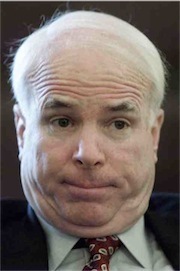
I think next year as an April Fool's joke, Joe Lieberman and John McCain should team up to write an op-ed about which countries they don't want to go to war with. Instead we get "LIEBERMAN, MCCAIN: IN LIBYA, REGIME CHANGE SHOULD BE THE GOAL".
Indeed. Perhaps a good time to link back to my 2008 article on McCain's love of war and review some of his classic ideas like when in the 1990s he wanted us to wage simultaneous wars on Iraq, Serbia, and North Korea:
Transforming the Kosovo conflict from a war fought with limited means for limited objectives to a ground invasion of Yugoslavia aimed at producing unconditional surrender in Belgrade would have divided the United States from our NATO allies, stripped the war of any legitimacy under international law, and risked creating the sort of deeply problematic post-war occupation the country has been enjoying in Iraq. Hence the Clinton administration's hesitancy. Eventually, the war was brought to a successful negotiated compromise that avoided a quagmire while securing Kosovo's autonomy. McCain characterized this outcome in a March 2000 floor speech as "unacceptable circumstances" (i.e., diplomacy) leading to a "weak and endangered peace" (i.e., compromise). Thus, having previously positioned himself on the extreme hawk side of debates over the Korean peninsula and Iraq, he secured the trifecta by assuming the same position on the Balkan situation.
Lieberman's no different. And, really, asking these guys about foreign policy questions is a joke. The answer is always war, always regime change, always "toughness" and then we move on to the next one.


The Balance of Power
Daniel Walker Howe on the US/Mexican balance of power at the dawn of the war:
The United States census of 1840 counted a burgeoning population of 17 million. The population of Mexico, by contrast, had declined by 10 percent during the prolonged disorders of her revolution against Spain and then leveled off; the government's calculation of 1842 (not an actual enumeration) showed 7 million Mexicans. The economies of the two countries displayed an even greater inequality. The years since 1815 had not been kind to the former New Spain; plagued by political instability, independent Mexico had not realized the economic potential of her natural resources. Fierce localism and poor transportation hindered the emergence of an integrated nationwide economy even more than they did in the United States. Independent Mexico received little European immigration and had even expelled its Spanish-born people, losing their talents and skills. Mexico's gross national product fell to less than half the peak attained in 1805; not until the 1870s did it exceed that level.
That's a reminder, among other things, that there's a strong nationalist case for making the country more open to immigration. Had the pre-WWI United States not had a basically open borders policy, we'd still be a very rich country, but probably not a "great" one. Instead we'd be geographically smaller, less densely populated, and much more agriculturally oriented—more like Australia perhaps.


Oil Shock Vulnerability
This from a CAP report is a nice graphical illustration of the relatively small impact of oil price swings on gasoline consumption in the short term:
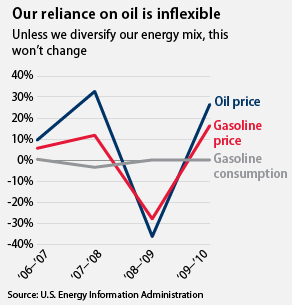
What that means is that if disruption in supply countries or a spike in demand in Asia causes prices to go up, aggregate spending on oil imports leaps. That puts a hammer on all spending on non-oil goods. The basic problem exists in all developed countries, but we have an unusually bad case of it because we've built an infrastructure that depends on very high levels of routine gasoline consumption (not just driving everywhere, but driving long distances and doing it in big cars) and that in many cases offers no viable alternatives. Moving away from this over the longer term would put a lot of extra resilience into the economy.
And note that whether or not we're consuming "foreign" oil makes extremely little difference here. If domestic production were larger relative to domestic demand that would alter the extent to which price spikes impact our trade balance, but it would still be the case that every sector of the economy that involves making and selling things that aren't oil gets hammered any time there's a price spike. The fundamental issue is inflexible dependence on oil, not the oil's nation of origin.


Welcome to Real America
Sign on the door of the Kauffman Foundation building in Kansas City:

In the liberal precincts where I've spent my whole life, this tends to go without saying.


Air Transit
Atrios says: "Yes, most airports in this country have crappy transit connections much as most cities have crappy transit, but we do actually have some decent ones. Off the top of my head there's Portland, Seattle, San Francisco, Chicago, Minneapolis, Baltimore, Philly, Washington (National), …"
I would add that America in some ways seems to be to do freakishly well on this score. Like Phoenix, Arizona is not really a mass transit town but it's single light rail line offers very convenient access to the airport if you happen to want to go to someplace near a light rail stop. DART will get you to DFW Airport quite nicely but, again, your trip would need to be near a DART station on the other end. Which is all just to say that most American cities just don't have much in the way of mass transit or transit-oriented development, but I don't think there's a particular problem of cities not remembering to connect their airports.


Matthew Yglesias's Blog
- Matthew Yglesias's profile
- 72 followers



